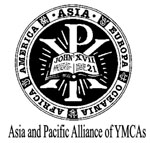|
Recognizing our many limitations, including the lack of capacity of staff and volunteers to organize and manage disaster response in affected areas, the APAY difficulties in identifying and coordinating resources for ready access not only because they are scarce but also due to the fact that initiating YMCAs are not familiar and comfortable using the YMCA International Emergency Coordination Protocol and with observing disaster response standards. It is a recognized need to have trained YMCA staff/volunteers able to support their YMCA in disaster preparedness so they can respond appropriately when disasters happen.
For this year’s workshop, therefore, we aimed to:
1. Build and develop the capacities of the staff and volunteers in developing emergency response actions, starting with a better understanding of international standards accountability;
2. Ensure the understanding and confidence of staff and volunteers in using the YMCA International Emergency Coordination Protocol and completing the Emergency Response Templates through a refresher session;
3. Share/present DRR pilot projects of some National Movements to inspire/encourage others to consider similar activities that are applicable to their needs and contexts and involve youth participation and leadership; and
4. Increase understanding of the project development process by considering the development of a community-based DRR pilot project, including youth-focused community activities.
The highlights of the learning process were on Needs Assessment and standards in emergencies; psychosocial support in post emergency period; the YMCA International emergency Coordination Protocol, Disaster Risk Reduction with examples on activities suitable with young people; Hazard Vulnerability and Capacity Assessment and experiential learning on Community asset Pentagon Mapping and DRR project development and budget planning.
A Post-workshop ‘test’ was conducted so as to compare the participants’ answers at the start of the workshop and see how much the participants have learned. The evaluation forms were distributed for completion as well as to get feedbacks from participants. The APAY is appreciative of the continuing support of the national movements who sent their participants to help develop capacities of their staff and volunteers in reducing risks when disasters do occur. We are indeed grateful for the continued support and cooperation of the Y Care International for providing financial support and in facilitating the workshop and learning process. Finally, we would like to thank the National Council of Sri Lanka for co-hosting, organizing and working with us to make this program a fruitful and meaningful one.
~ Eloisa Borreo, Executive Secretary, APAY
GATN National Training Workshops
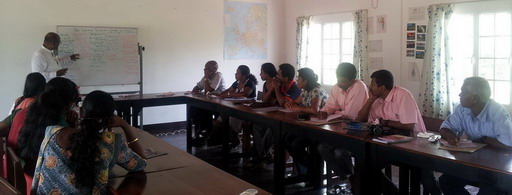
Promotion of Alternative Tourism is one of the recent initiatives of the APAY. The Global Alternative Tourism Network has been launched last year and has made remarkable progress in achieving its goal. A number of alternative tourism sites have been established, trainings and workshops have been hosted for skill development of the stake holders. It has been felt that trainings at local level would be more effective to promote community tourism in the YMCA movements, as such recently two National Alternative Tourism Training Programs were held in Sri Lanka and Bangladesh.
The first of such trainings were held in Sri Lanka, at YMCA Folk School, at Kallar, near Batticaloa, Sri Lanka, during 2nd & 3rd of August 2013. Twelve representatives from five local YMCAs and YWCAs, from Pandateruppu, Valaichdhenai, Komari, Mannar and Unawatuna attended the training workshop. Ranjan Solomon, Advisor of the GATN Task Force of APAY and Duncan Chowdhury, Executive Secretary for Programs, APAY conducted the training workshop.
Similarly another training workshop was held in Dhaka, Bangladesh during 11th and 12th of August. There were 12 representatives from 3 local YMCAs, namely, Birisiri, Bogra and Kaligram who participated at the Workshop.
During the workshop, the participants were shared with the present state of mass tourism and how this had negative impact on the local communities, the environment and the ecology, how they harm the local culture and heritage. The participants resolved to launch alternative tourism sites in their respective localities, where the local communities will be enriched through the tour programs, every efforts shall be taken to protect the environment and ecology and the local culture and heritage shall be upheld in the program.
It was envisaged that about 9 new Alternative Tourism sites could be developed in these two countries in near future.
After both the workshop, visits were arranged to prospective sites, where the Alternative Tourism sites could be developed.
~ Duncan Chowdhury, Executive Secretary, APAY
What to expect to Change Agents?
YMCA exists in 119 countries in the world and a total of 58 million people are members and beneficiaries of the YMCAs, of which nearly a half are children and youth. Are your YMCA and its programs relevant to the issues of the actual situations that many young people are facing with? The World Alliance of YMCAs conducted a survey to all the member movements in 2011. Through this survey, we understood important issues related to young people. We analyzed the data and found out the four important issues that YMCA can and should do for the young people worldwide.
First, the YMCA should deal with the Health issues of the Young people. There are increasing concerns over HIV/AIDS, Drug abuse, and increasing trends of Obesity and chronic diseases such as diabetes among young people.
Secondly, the YMCA should deal with unemployment issues among young people. There are also increasing trends of insecure employment practices especially among young workers. The "working poor" would be another issue.
Thirdly, Environmental issue is important and related to the future lives of young people. We realized the climate changes all over the world caused by our economic behaviors. We need to act consciously and concretely.
Fourthly, importance of Civic Engagement was listed. Many YMCAs in the world realized the importance of Global Citizenship and concrete actions (volunteer activities) taken as our social responsibilities.
What are we going to do with these findings? What do we expect to local YMCAs? What do we need to do as the global youth organization? The idea of Change Agents started from these questions. We should hear more voices of young people. We decided to select young people, staff or volunteer, who represent the voices from each country movement. Then two/three from each movement were selected as "Change Agents".
The first global level meeting was held in this August 2013 in Prague. About 200 change agents from 60 countries gathered for the first time and discussed what to do as change agents when they go back to the own local/national movements. Those are:
1. When returned, discuss with their national/local YMCA leaders of what they can do, what need to be done in the National/local YMCAs first.
2. In the Asia Pacific area, APAY Youth Committee (called YPLD) decided to conduct the "APAY Green Challenge 2013" during October 18 to 31, 2013. This time we will do any action related to Green. The Y’s Men also may join as the YMCA partners.
3. The World Alliance will conduct the One Million Voice Survey starting January 2014. This will be done in the world and find out more of the youth voices related to the four issues, health, employment, environment and civic engagement. We could show what young people in general feel the issues and expect to YMCAs and to the society. Then we could use this data for various levels of policy makings and for developing programs in YMCA.
4. The World Alliance is planning to conduct the 2nd World Challenge on June 6, 2014, that will be the day of 170th anniversary of the first YMCA. This will encourage participation of many young people all over the world.
5. The World Council will be held in Jun/July 2014 in Colorado, USA. All the change agents will play important roles in the Council and making future plans for youth empowerment.
6. The APAY will work with the same change agents till its General Assembly (September 2015 in Korea). The future direction of YMCAs in Asia Pacific is also discussed from their experiences as change agents.
We have 45 change agents from 20 movements in Asia Pacific. Those who participated in the Prague festival received big impacts from the trainings and the other change agents from all over the world. I have realized that those change agents alone may face difficulties to work for the National and local YMCAs. I would like to request all the National Council to meet with the selected change agents first and discuss together what they could start their expected works and to develop strategies to strengthen the youth work in the YMCA.
In order to further strengthen youth activities, it might be necessary to recruit more youth leaders (we may call them as also change agents) from each local YMCA, and they all gather for the national level training and making action plans nationally as well as locally. In this way, young people’s voice can be more reflected in the YMCA policies and plans for the future. I am sure that these waves of youth development, through global and local change agents, would make the YMCA stronger and more visible nationally and globally.
~ Kohei Yamada, General Secretary, APAY
Change Agents Training
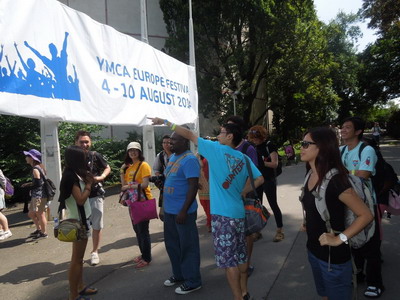
About 200 Change Agents from various YMCA movements participated at their first training of Global Challenge which was held during 4-10 August, 2014 in Prague, Czech Republic at the YMCA Europe Festival. Over 5,000 young people gathered at the Festival. From the Asia and Pacific Alliance of YMCAs 25 Change Agents participated at the training and decided on meaningful projects in future.
During the Prague Festival, the APAY Change Agents organized T-Shirts sharing, Workshops and Expo for the global participants. It was a great event when more than 900 youths shared their T-shirts in the APAY Tent.
The Change Agents of APAY shared their respective national and local programs, project and stories with the other participants. Change Agents from India, Hong Kong, Macau, Japan, Philippines, Myanmar, Malaysia, Singapore, Australia, New Zealand and Sri Lanka joined at the global training program.
The World Council Meetings of the World Alliance of YMCAs shall be held in July 2014 and about 1,500 YMCA leaders from around the world are expected to participate. The Change Agents will participate at the World Council as a Facilitating Team. They will have an opportunity to share their experiences, stories, challenges and success stories with the YMCA leaders participating at the World Council. Creative Presentations by the Change Agents will also be a part of the meeting, like Plays, Music, etc.
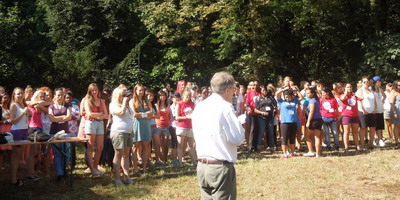
One Million Voices
The goal of the One Million Voices Research Project is to collect and understand young peoples’ perception of their current situation and what it should be in the context of their individual and collective opinion the country each live. The project will contribute to the understanding of youth perspective on social justice issues and barriers and opportunities in relation to youth. The learning from the research will have significant implication for issues of collective and individual, family and society, at present and in the future.
This is a comprehensive research project to raise the youth voice from local communities to global platforms to work towards a better quality of life for young people age 15-25.
Time Table of "One Million Voices"
| Pilot Testing with at least 60 countries |
September 2013 |
| Training/Preparation of Interviewers |
October to December 2013 |
| Logistics and Coordination with YMCAs |
September to December 2013 |
| Launch Survey Implementation |
January 2014 |
| Data Collection |
January to August 2014 |
| Data Processing and Analysis |
September 2014 to May 2015 |
| Dissemination of Results |
June 2015 |
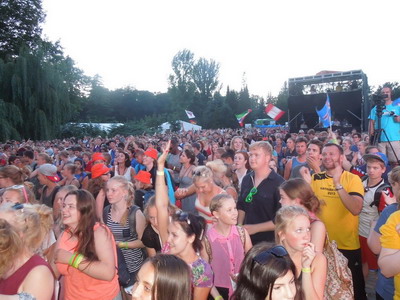
~ Roger Peiris, Youth Programme Officer, APAY
YMCA of Timor Leste: Women Empowerment Program
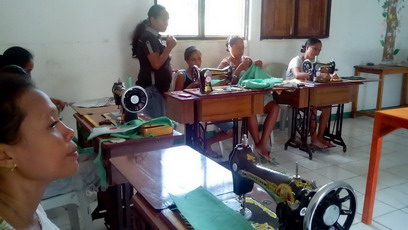
YMCA of Timor Leste has observed that many house wives who live around YMCA at Terra Santa didn’t have activity for themselves, just staying at home, taking care for the children and totally dependent on their husbands. These house wives put all of their trust on their husband and doing all the necessity of household works. However, sometimes when their husbands suddenly die, they are not ready to stand for themselves as a mother to take care for their children. With these reasons, YMCA of Timor-Leste seeks to help and equip these women with skill through the programs of sewing, in order to recycle second-hand clothes for extra income for their families.
The first ever Women Empowerment Training Program of the Timor Leste, a Sewing Project has started from July 8th, 2013 with 10 trainees. The trainees shared with me about their dreams and hope of joining the Sewing Training Program. They spent two hours each day for training and practicing their skills at YMCA Terra Santa. One participant said, after the training, she will help other house wives in the community what she has learnt. Another said, together, they can form a sewing club with YMCA and start a small business for some additional income. Another shared that after joining this training course, she felt more confident to take care of the family. Another expressed that they need financial resource to start small business after the training. Hope YMCA could help. They seem quite happy and supporting each other. This, hopefully, is just a beginning of the empowerment process where the participants will be introduced to other level of empowerment process to address the other strategic needs. The project is still a welfare approach and just an entry point to increasing capacities on other skills in leadership and project management. Overtime, when all the program components have been implemente3d and experienced by the participants, change will graduallybe observed. It was great to see people from community coming to the YMCA, learning together, have fellowship and getting stronger to stand for their family and community.
The objectives of this six months women empowerment program are; creating an alternative activity for women, creating possible self-employment program, increase family income, have dignity and free from dependency, and recycle the used clothes to save the environment.
~ Richard Kaing, Movement Strengthening Coordinator, APAY
Voices from Youth
It's time for us to act
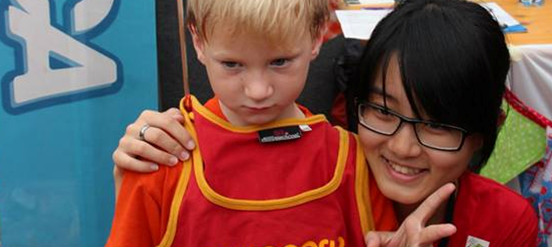
During YMCA Europe Festival, more than 200 YMCA change agents from all over the world gathered in Prague and received trainings. With greets and chats, the performances, the new YMCA songs, and the festival itself, we shared lots of memories. We are ready for –One Million Voices, World Council, YMCA World Challenge, Resource Group on Environment as well as Global Digital Accelerator. We have got a platform for raising questions, clearing our doubts, and sharing insight with global change agents.
Now, it’s time to act. Are you with us? Be the change you wish to see in the world.
~ Caroline Tsang, Chinese YMCA of Hong Kong
YMCA T-shirts exchange. Czech It Out !
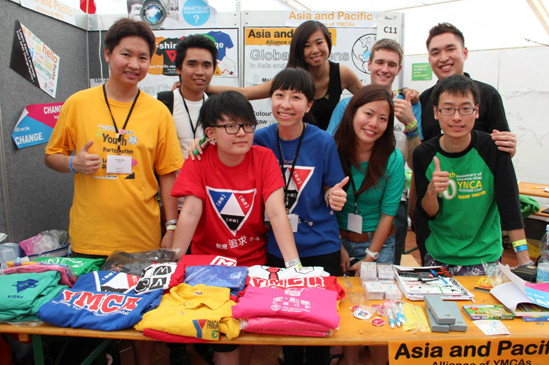
I do not have enough vocabularies to describe my experience in Prague. And it will probably take me more than a few paragraphs to write about my story. Therefore, I communicate with you with hundreds of colourful photos on APAY youth committee (YPLD) and change agents facebook page. Check (Czech) it out!
27 APAY change agents organized a YMCA T-shirt exchange in Prague. It was an extremely busy expo stall—teaching Asian languages, swapping T-shirts and sharing APAY experience. More than 900 T-shirt-times were in just two days!
~ Barry Teh, Malaysia
Challenging Green Vegetables Redistribution
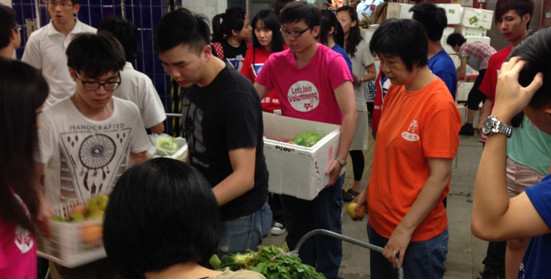
You may wonder how "food’ can become "waste"? Indeed, my city generates over 3200 tonnes discarded food every day. The vast majority of this food ends up in landfill. Meanwhile, many low-income households cannot afford to buy enough food for their families. Located in one of the poorest neighbourhoods, YMCA of Hong Kong Cheung Sha Wan Centre confronts various challenges on this green issue. My volunteer team is volunteering in a Vegetables Redistribution project where we come with 3 purposes: reducing food waste, reusing resources, as well as empowering the community.
I was so amazed when our youth volunteers first collected about 300kg leftover vegetables from vegetable sellers from nearby markets. Some sellers even showed their support by purposely reserving fresh veggies for us. After a few times of collection, our youth can remember the name of every seller although we are not from the district. Some local elderly and children joined our action after they appreciated the youth’s passion and impact. The project is not a one-off campaign but rather a long term commitment to green. However challenging it is, we still do it.
~ Fiona Lee, YMCA Hong Kong
APAY Green Challenge - Green to the Core

Imagine different activities towards one goal... The aim of the APAY Green Challenge is to do a green activity to make the youth aware about their responsibility towards the society and attract more youth through these activities to the YMCAs. From 18 to 31 October, you can select a day/ week to do activities on Green issue. It could be a work camp, cleaning roads, planting trees, awareness program, exhibitions, art competitions etc. Be creative do an activity which is most suitable for your community.
Set up ambitious goals for your event and go for it! Asia and Pacific Alliance of YMCAs will recognize all events registered with a participation certificate. To download the full event manual, please visit
http://www.asiapacificymca.org/apaygreenchallenge2013/
APAY Green Ambassadors Blog and Green YMCA awards are now linked on APAY homepage (http://www.asiapacificymca.org/). Let’s go Green!
|
